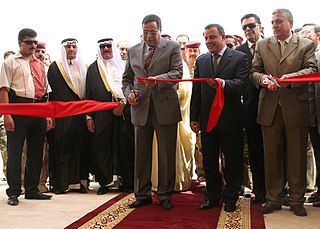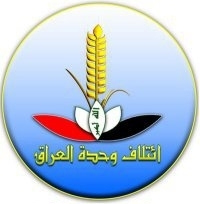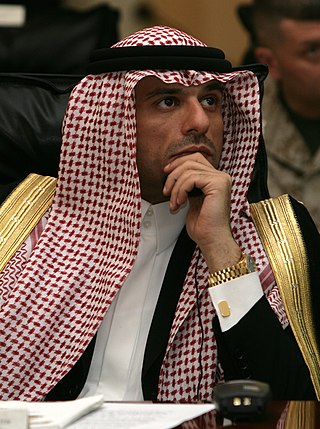| |||||||||||||||||||||||||||||||||||||||||||||||||||||||||||||||||||||||
All 29 seats for the Al-Anbar governorate council | |||||||||||||||||||||||||||||||||||||||||||||||||||||||||||||||||||||||
|---|---|---|---|---|---|---|---|---|---|---|---|---|---|---|---|---|---|---|---|---|---|---|---|---|---|---|---|---|---|---|---|---|---|---|---|---|---|---|---|---|---|---|---|---|---|---|---|---|---|---|---|---|---|---|---|---|---|---|---|---|---|---|---|---|---|---|---|---|---|---|---|
| Turnout | 40% ( | ||||||||||||||||||||||||||||||||||||||||||||||||||||||||||||||||||||||
| |||||||||||||||||||||||||||||||||||||||||||||||||||||||||||||||||||||||
| |||||||||||||||||||||||||||||||||||||||||||||||||||||||||||||||||||||||
The Al Anbar Governorate election of 2009 was held on 31 January 2009 alongside elections for all other governorates outside Iraqi Kurdistan and Kirkuk.
| |||||||||||||||||||||||||||||||||||||||||||||||||||||||||||||||||||||||
All 29 seats for the Al-Anbar governorate council | |||||||||||||||||||||||||||||||||||||||||||||||||||||||||||||||||||||||
|---|---|---|---|---|---|---|---|---|---|---|---|---|---|---|---|---|---|---|---|---|---|---|---|---|---|---|---|---|---|---|---|---|---|---|---|---|---|---|---|---|---|---|---|---|---|---|---|---|---|---|---|---|---|---|---|---|---|---|---|---|---|---|---|---|---|---|---|---|---|---|---|
| Turnout | 40% ( | ||||||||||||||||||||||||||||||||||||||||||||||||||||||||||||||||||||||
| |||||||||||||||||||||||||||||||||||||||||||||||||||||||||||||||||||||||
| |||||||||||||||||||||||||||||||||||||||||||||||||||||||||||||||||||||||
The Al Anbar Governorate election of 2009 was held on 31 January 2009 alongside elections for all other governorates outside Iraqi Kurdistan and Kirkuk.
The governorate is overwhelmingly populated by Sunni Arabs. The sitting governorate council was elected in the 2005 Iraqi governorate elections. These elections took place at the same time as the January 2005 Iraqi legislative election and were boycotted by nearly all Sunni Arab parties. The Iraqi Islamic Party was the only significant Sunni Arab party to put up candidates but they also withdrew from the ballot days before the election.
The turnout in Anbar was 2% for the legislative elections and only 0.5% for the governorate election. [1] Therefore, although the Iraqi Islamic Party has traditionally been stronger in Mosul, they ended up with nearly all the seats on the governorate council.
From 2004, the governorate became a major site of the insurgency in Iraq directed against the Iraq government and occupying United States army. However, the formation in September 2006 of the Anbar Salvation Council was a turning point, and led to the American-backed tribal forces driving al-Qaeda in Iraq and other insurgents out of al-Anbar.
More than 520 candidates stood in Anbar, from 37 party lists. [2] The main contest was between the Iraqi Islamic Party which ran the council since 2005 and various parties linked to the Awakening movements formed by tribal leaders and funded by the United States to fight against al-Qaeda in Iraq. Analysts predicted the IIP standing on their own would be "wiped out" in Anbar by the Awakening movements. [3] the Iraqi Islamic Party formed the Coalition of Intellectuals and Tribes together with uniting the Islamic Party, the gathering of Anbar’s Tribal Leaders and Intellectuals, Iraq’s People’s Conference and the Independent Tribal National Gathering. [4]
Lists associated with the Awakening movements included the Iraq Awakening and Independents National Alliance and the National Front for the Salvation of Iraq. The Alliance was led by Sheikh Ahmed Abu Risha, Sheikh Amir Ali al-Sulaiman and Sheikh Hameed al-Hayyes [3] Sheikh al-Hayyes left the Alliance before the election and contested as head of the "Anbar Salvation Council" list. [5]
The National Front was led by Sheikh Ali Hatim, the tribal leader of the Dulaim tribal confederation - the largest in Anbar - and has previously clashed with Abu Risha's brother, Abdul Sattar Abu Risha, when he was the head of the Anbar Salvation Council. [6] The Front claimed the support of the Anbar Salvation Council, the Al-Anbar Awakening Congress, and the Council of Al-Anbar Sheikhs. [7]
The Tribes of Iraq Coalition, headed by Hamid al-Hais is another list which claims to be backed by tribal leaders.
Saleh al-Mutlak's Iraqi National Dialogue Front is the only significant list that doesn't rely on support from tribal leaders, being based on former Ba'ath Party supporters. [2]
Following the vote, supporters of the IIP and the Sahawa gathered in the capital, Ramadi, and started firing in the air to celebrate victory. Iraqi police quickly dispersed the groups and announced a curfew.
Early leaked results indicated that the lists backed by the IIP had won 12 of the 29 seats on the council - the largest number for any party. Sahawa supporters accused the IIP of adding 100,000 fraudulent ballot papers and threatened a violent reaction if it was confirmed. Sheikh Ahmed Abu Risha threatened to "transfer our entity from a political to a military one" and "to fight the Islamic Party and the [Electoral] commission". [8] [9] The IIP condemned the threats of violence saying this behaviour would "take us back to the Middle Ages" [9]
The Deputy Prime Minister of Iraq and IIP member, Rafi al-Issawi, called for a recount with people accused of fraud prosecuted. Iraqi National Dialogue Front leader Saleh al-Mutlaq said most of the lists thought the IIP had manipulated the vote, he had seen fraudulent ballots himself and the vote had been "tainted". [10]
The Electoral Commission said they had received a flood of complaints which they were investigating - including some serious complaints that could alter the outcome of the vote. Commission officials met with Abu Risha, assured him they would not tolerate any forgery and asked him to avoid confrontation with the IIP. [11]
Following the election, the Iraq Awakening and Independents National Alliance nominated as governor Qasim Al-Fahdawi, a businessman who had recently been running a construction company in the United Arab Emirates. He was elected by 24 votes to 3 and formed a government including all parties except for the Iraqi Islamic Party's three members. [12] Dr. Jassim al-Halbusi was elected chairman of the provincial council.
 | |||||
|---|---|---|---|---|---|
| Party | Votes | % | Seats | +/– | |
| Iraq Awakening | 56,262 | 17.74 | 8 | +8 | |
| Hiwar | 53,487 | 16.87 | 6 | +6 | |
| Coalition of Intellectuals and Tribes | 51,733 | 16.32 | 6 | −28 | |
| Al Hal | 23,835 | 7.52 | 3 | +3 | |
| Iraqi National List | 21,551 | 6.80 | 2 | +2 | |
| Iraqi National Unity Coalition | 14,439 | 4.55 | 2 | +2 | |
| Tribes of Iraq Coalition | 13,798 | 4.35 | 2 | +2 | |
| Other parties | 81,969 | 25.85 | 0 | – | |
| Total | 317,074 | 100.00 | 29 | −12 | |
| Source: Niqash, [13] Al Sumaria, New York Times | |||||

Al Anbar Governorate, or Anbar Province, is the largest governorate in Iraq by area. Encompassing much of the country's western territory, it shares borders with Syria, Jordan, and Saudi Arabia. The population is mostly Sunni Arabs. The provincial capital is Ramadi; other important cities include Fallujah, Al-Qa'im and Haditha.

The Iraqi Islamic Party is the largest Sunni Islamist political party in Iraq as well as the most prominent member of the Iraqi Accord Front political coalition. It was part of the government of Prime Minister Nouri al-Maliki and is part of the current government of Haider al-Abadi since 2014. Osama Tawfiq al-Tikriti succeeded Vice-President Tariq al-Hashimi as the party's secretary-general on 24 May 2009, who was succeeded in July 2011 by Ayad al-Samarrai.

Abdul Sattar Abu Risha – Sheikh Abdul Sattar Eftikhan al-Rishawi الشيخ عبد الستار افتيخان الريشاوي – was a high-profile Iraqi tribal sheikh of the Abu-Risha tribe. He was the leader of an alliance of Iraqi Sunni Arab tribes that opposed al-Qaeda in Iraq.

The Sons of Iraq or al-Sahwah were a coalition in the Al Anbar province in Iraq between Sunni tribal leaders as well as former Ba'athist Iraqi military officers that united in 2005 to maintain stability in their communities. A moderate group, they were initially sponsored by General Petraeus and the US military.

Sheik Ahmed Bezaa Abu Risha is a Sunni leader in the Al-Anbar province, and led the movement of Sunni tribesmen known as the Anbar Salvation Council.

Governorate or provincial elections were held in Iraq on 31 January 2009, to replace the local councils in fourteen of the eighteen governorates of Iraq that were elected in the 2005 Iraqi governorate elections. 14,431 candidates, including 3,912 women, contested 440 seats. The candidates came from over 400 parties, 75% of which were newly formed.

Parliamentary elections were held in Iraq on 7 March 2010. The elections decided the 325 members of the Council of Representatives who would elect the prime minister and president. The elections resulted in a partial victory for the Iraqi National Movement, led by former Interim Prime Minister Ayad Allawi, which won 91 seats, making it the largest alliance in the Council. The State of Law Coalition, led by incumbent Prime Minister Nouri Al-Maliki, was the second largest grouping with 89 seats.
The National Front for the Salvation of Iraq is a political party in Iraq. It developed out of the Awakening movements and is mostly made up of Sunni Muslim tribal leaders from Al-Anbar province, an ethnic Arab region.

The Nineveh Governorate election of 2009 was held on 31 January 2009 alongside elections for all other governorates outside Iraqi Kurdistan and Kirkuk Governorate.
The Iraq Awakening and Independents National Alliance is an Iraqi political coalition formed to contest the 2009 Al Anbar governorate election. It obtained 8 out of 29 seats - the highest of any party list.
The Tribes of Iraq Coalition also known as the Anbar Salvation Council is an Iraqi political coalition formed to contest the 2009 Al Anbar governorate election which won 2 out of 29 seats. The party was one of several formed out of the Awakening movements - Sunni tribal militias armed and financed by the United States Army to fight al-Qaeda in Iraq. The coalition was led by Sheikh Hamid al-Hais. In an interview with the Washington Post prior to the election, Hais said he would kill all the Iraqi Islamic Party's candidates if anything happened to any of his candidates.
Osama Maukhlif Tawfiq al-Tikriti is a former leader of the Iraqi Islamic Party, a Sunni Arab religious party which was the largest Sunni Arab led party in the Iraqi legislative election of December 2005.

Qasim Mohammad Abid Hammadi al-Fahadawi is an Iraqi politician and businessman who is the current Minister of Electricity in the Al Abadi Government, and who previously served as the Governor of Anbar from April 2009 to August 2013.
The Intellectuals and Tribes Alliance for Development or Coalition of Intellectuals and Tribes was an Iraqi political list which stood in the 2009 Al Anbar governorate election. The list was created by the then ruling Iraqi Islamic Party because their popularity had severely decreased. They formed an alliance together with the Coalition of Intellectuals and Tribes together with uniting the Islamic Party, the gathering of Anbar’s Tribal Leaders and Intellectuals, Iraq’s People’s Conference and the Independent Tribal National Gathering. The list won 15.9% of the vote and 6 out of 29 seats.

The Unity Alliance of Iraq commonly known as Iraq's Unity, Iraqi Unity or Wassat is an Iraqi political coalition formed to contest the 2010 Iraqi parliamentary election. The coalition was formed by Sheikh Ahmed Abu Risha, the head of the Awakening movement, a Sunni tribal militia which was successful in significantly reducing the insurgency in al-Anbar Governorate and was then reformed into a political party, the Iraq Awakening and Independents National Alliance, which won the most seats in the 2009 Al Anbar governorate election. The Awakening Alliance joined forces with Iraq's Shi'a interior minister Jawad al-Bolani and his secular Iraqi Constitutional Party and Ahmed Abdul Ghafour al-Samarrai, chief of Sunni Endowment Office. The list is led by Jawad al-Bolani.
The Al Anbar governorate election of 2013 was held on 20 June 2013 alongside elections for Nineveh.

The 2013 Nineveh Governorate election in Iraq was held on 20 June with elections for the Al Anbar Governorate. Due to security problems, turnout was less than half that of the 2009 election. This election saw Sunni Arab parties lose a number of seats to minority parties.

The Islamic State of Iraq was a Salafi jihadist militant organization that fought the forces of the U.S.-led coalition during the Iraqi insurgency. The organization aimed to overthrow the Iraqi federal government and establish an Islamic state governed by Sharia law in Iraq.

The Uniters for Reform Coalition is a Sunni political coalition in Iraq.

Ali Hatem Abd al-Razzaq Ali al-Suleiman al-Assafi al-Dulaimi, better known as Ali Hatem al-Suleiman, is an Iraqi Sunni tribal leader who is the leader of the Dulaim tribe, in the Al Anbar Governorate.